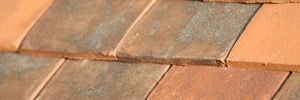 Marley Eternit has launched a new range of premium handmade clay plain tiles to help create stand-out roof designs for high quality housing developments and sensitive refurbishments.
Marley Eternit has launched a new range of premium handmade clay plain tiles to help create stand-out roof designs for high quality housing developments and sensitive refurbishments.
The company says the Canterbury range provides a genuine handmade appearance that specifiers are looking for in the current market. The traditional handmaking process used to create the range includes random undulations and variations that give each tile a unique appearance and character. The tiles are also available in three rich colours with soft edges, fully formed nibs and a sandfaced texture which is synonymous with the traditional manufacturing process.
The Loxleigh handmade clay plain tile has a subtle variation in colour, ranging from red to grey and black with a sanded finish to give a premium antique reclaimed appearance. The Burford has a rich red-brown tone in a fully sanded texture, which Marley Eternit says adds warmth and character to the roof. Finally, the Chailey has a more vibrant orange tone with a sandfaced texture that can be used on the main roof, or as a contrast tile for vertical detailing.
In addition, all three colours can be mixed on the roof to create a unique blend and achieve a patchwork of colours that is often seen on traditional roofs in Suffolk, Sussex and Kent. Canterbury clay plain tiles are also available with a complementary range of traditional handmade fittings and decorative accessories.
Sarah Jackson, marketing product manager at Marley Eternit, said: “In recent years, homeowners, builders and architects have rediscovered the potential of natural handmade clay tiles and there has been something of a resurgence in their use. In many cases, planners will only accept genuine handmade tiles for heritage or conservation projects and there is also a growing demand from premium house-builders looking to distinguish their properties with an authentic handmade clay plain roof tile.
“We are really excited to be able to introduce the Canterbury handmade range to meet growing demand, bringing back the traditional skills and craftsmanship to our clay facility in Staffordshire. It means we can now combine authentic production methods that are true-to-tradition with modern firing techniques, to create beautiful clay tiles that are highly durable.”
All Canterbury handmade clay plain tiles are made from Etruria Marl, which Marley Eternit says is widely accepted as the finest clay for strength and durability. The process starts with the hand maker sprinkling some sand into the bottom of the mould to help give the tiles their individual colour and sanded texture.
They then place a pre-cut rectangular shaped ?clay bat’ into the centre of the mould and the maker ‘knocks’ the raw clay by hand, using a wooden mallet, to achieve the desired shape and thickness. The excess clay is wired off and a punch is brought down to create the nail holes and nibs and at the same time, identification marks and batch numbers are stamped into the back of the tile.
Finally, the hand maker releases the tile from the mould and removes any excess clay from the nail holes, before placing the unfired or ?green’ tiles on a metal drying tray. Once fired, the clay tiles will never fade and it is the firing process, combined with the natural clay and the different sands, which gives the tiles their beautiful distinctive colours.
Ms. Jackson adds: “The Canterbury tiles give a distinctive handmade finish to the roof and each tile is as unique as the hands that made them. The handmade range enables architects to have more choice when it comes to specifying for both heritage projects and those that demand a premium clay aesthetic.”




